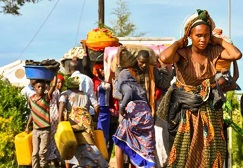Immediate action to address the escalating humanitarian crisis in eastern Democratic Republic of Congo (DRC) must be taken before the situation deteriorates further, urges the Norwegian Refugee Council (NRC).
The recent advance of armed groups towards the key town of Sake, a crucial link connecting the city of Goma to the rest of the country, poses an imminent threat to the entire aid system in eastern DR Congo, with potentially devastating consequences for the civilian population. Reports show that decades of clashes between armed groups, widespread violations of human rights, and devastating incidents of gender-based violence have displaced 6.1 million people within the DRC.
Increased violence has directly affected civilians with heavy artillery and mortar fire hitting settlements and densely populated areas, including Goma’s outskirts. “The safety of civilians must be paramount. All parties to the conflict must uphold their obligations under international law to protect civilians from harm. This includes ending attacks on civilians and ensuring unhindered access for humanitarian assistance,” said Eric Batonon, NRC country director in DRC.
“We are deeply concerned about the escalating violence and its devastating impact on innocent lives. The targeting of civilians, including women, children, and the elderly, is unacceptable and must stop immediately,” he added.
The isolation of Goma, home to over 2 million people and hosting hundreds of thousands of displaced individuals who have fled clashes with armed groups, would bring disastrous consequences to the region. The incremental isolation of the city hampers the ability of international humanitarian organisations to reach displaced people in the eastern region, exacerbating an already dire situation.
The recent escalation in the conflict in neighbouring Masisi, has further restricted humanitarian access, with over 630,000 displaced people remaining without access to essential services such as healthcare and food for over a week.
Displaced families fleeing violence and atrocities in North Kivu province require urgent assistance, including food, shelter, water, hygiene, and sanitation.
For instance, in the Rusayo 1 camp near Goma, 18,000 people arrived just over a single weekend this month, fleeing the fighting in Sake. Water supplies can only provide a little over 3 litres per person daily, compared to the minimum standard of 15 litres. Hygiene facilities are also extremely limited, with only one shower for every 500 people.
The arrival of displaced people is placing a severe strain on what limited resources do exist, and worsening shortages amongst the local community. Schools are often repurposed as temporary shelters, further depriving children of an education.
“The humanitarian response in the region was already on a precarious footing: now it teeters on the brink of collapse,” said Batonon. “Humanitarian organisations on the ground require unimpeded access and support to meet the pressing needs of the vulnerable people who have been forced to flee. Just getting sufficient food to eat is a major challenge for people with all roads to Goma having been cut off by the fighting.”
As fighting intensifies and the humanitarian situation deteriorates, NRC urges all parties involved to prioritise the protection of civilians and facilitate unhindered access for humanitarian organisations. The international community must act swiftly to avert a catastrophic outcome and alleviate the suffering of millions caught in the crossfire of conflict in eastern DRC.
Facts and figures
– In total, there are 5.8 million internally displaced people in Ituri, North Kivu, South Kivu, and Tanganyika combined (UNHCR).
– Humanitarian organisations estimate that about 1 million people have been displaced since November 2023 (FONGI).
– 135,000 displaced people moved towards Goma between 2nd and 7th February 2024. Others have taken shelter in schools, churches, and other makeshift settlements (OCHA).
– The renewed violence in Masisi Territory is restricting humanitarian access to more than 630,000 displaced people who were already living in the area (OCHA).
– According to an assessment carried out by NRC in DRC, 18,000 people arrived in the Ruyayo camp between 3rd and 5th February 2024. This assessment is also the source of the information included on conditions in the camp.
– Goma is home to over 2 million people, with at least 500,000 displaced (OCHA).
Photographs of newly displaced people now living in Goma are available on request.

